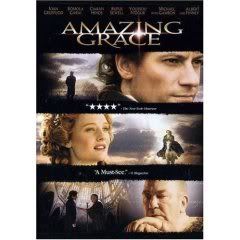
 Amazing Grace - 2006
Amazing Grace - 2006
Amazing Grace is the story of William Wilberforce's 20 year British political fight to end the business of slavery. The slave trade was a very lucrative money maker and intrenched in the British economy. During the early 1800's, slavery was integrated into the economies of Britain, France, the West Indies, America, Austria and Portugal - primarily to fuel the sugar industry.
Wilberforce has a promising career ahead of him in the British Parliament when he has a Christian conversion. Convinced by his friend William Pitt to remain in government service instead of church service, he takes on the formidable challenge of taking on the slave trade. To William, the moral imperative of stopping the horror of slavery surpasses any economic concerns that may ensue. Surely many will see economic ruin, jobs will be lost and businesses will crumble. None of these concerns stop William for even a pause.
William's wife Barbara, played by Romola Garai, illustrates the wonderful adage that behind every good man is a good woman. She encourages him, supports him and loves him throughout hid life. At one point when William feels as if his work is going nowhere she tells him: "It seems to me, that if there is a bad taste in your mouth, you spit it out. You don't constantly swallow it back."
It was interesting to see Rufus Sewell in the role of Thomas Clarkson, Willberforce's colleague in the war on slavery. I last saw him 1998's Dark City. He does a powerful job here and is mesmerizing to watch.
The movie shows an interesting molding of history and faith working together. There is an appearance from John Newton, a slave trader turned monk, and writer of the song and movie title, Amazing Grace. He plays a pivotal role in William's life by persuading him to serve God where he was instead of entering the ministry.
History is never boring when told well and this story is never boring. Having watched the movie has prompted me to research the era further. Explaining my new interest in abolition history to my coworkers has caused a few quizzical looks.
But above all this is a movie with strong messages about struggle in life, about staying the course, fighting the good fight and about being salt and light in the world.




